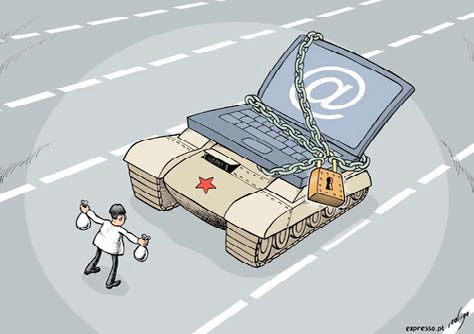KENDALL GRANT & KATHEY GUO
<Contributors>
In most countries, the Internet has been responsible for helping to facilitate greater freedom of expression for its citizens. However, this is not a universal truth. To take the starkest example, the Internet censorship system in China, dubbed the “Great Firewall of China,” is among the most stringent in the world. The government has constantly blocked Web sites that mention the Dalai Lama, Tiananmen Square, Falun Gong, and a number of other “forbidden” topics. In January 2001, Human Rights Watch reported that a new Chinese government regulation made it a capital crime to send “secret” or “reactionary” information over the Internet. In late 2008, a pro-democracy movement named Charter 08 released an online petition calling for an end to the Communist Party’s monopoly on power, but was promptly shut down.
 Since then, bans on Facebook, YouTube, and Twitter, once thought to be temporary, are now considered permanent, with “government-friendly” alternatives strengthening in influence. China’s endeavours have even brought it into conflict with the largest of online behemoths. Google initially closed its search service in mainland China in March 2010 before its subsequent reentrance in June, announcing that the Beijing government had renewed its license to operate. However, tensions between China and Google have persisted, and in March 2011, Google accused Beijing of making it appear as if technical problems at Google, and not government intervention, were to blame for a disruption of its Gmail service in the country.
Since then, bans on Facebook, YouTube, and Twitter, once thought to be temporary, are now considered permanent, with “government-friendly” alternatives strengthening in influence. China’s endeavours have even brought it into conflict with the largest of online behemoths. Google initially closed its search service in mainland China in March 2010 before its subsequent reentrance in June, announcing that the Beijing government had renewed its license to operate. However, tensions between China and Google have persisted, and in March 2011, Google accused Beijing of making it appear as if technical problems at Google, and not government intervention, were to blame for a disruption of its Gmail service in the country.
As online efforts to organize protests began reverberating throughout the Middle East and North Africa in 2011, the Chinese government became more aggressive in its commitment to smother all hints of anti-government sentiment. Restrictions continued to tighten during 2012, and faint hopes of a possible reprieve were squelched when the once-a-decade party conference in November (at which power was handed to younger officials) did nothing to indicate governmental deviation from its hostile censorship strategies.
In addition to its massive firewall and other tactics, the government employs thousands of commentators, known derisively as “50 Cent Party members,” who pose as ordinary users to counter criticism of the government and are often paid 50 Chinese cents per posting. It is estimated that up to 50,000 Internet police and 300,000 commentators participate in this effort to shape and alter public opinion. Yet despite one of the most technically sophisticated Internet censorship programs in the world, China still has a vibrant online community of 70 million bloggers and more than 300 million Internet users, higher than in any other country.
The most effective method to counter the harsh regime, and its detrimental impact on freedom of expression, has been the subject of intense debate. Steven M. Bellovin, a professor of computer science at Columbia University, says the issue of online censorship is ultimately related to cost, and that the real question is how much China is willing to spend on measures that keep up with technological innovation. Ross Anderson, a professor of security engineering at Cambridge University, argues that due to the volume and complexity of web traffic, as well as the growing use of encryption, censorship is becoming more difficult. Jonathan Zittrain, a professor of law at Harvard, is equally optimistic, claiming that while individual users must take most steps, Web sites could design new protocols to better share information, creating a kind of “mutual aid treaty” for the Internet. Companies like Google can also assist by investing in improved circumvention technologies.
However, most concede that Internet censorship in China is as much a social and political problem as a technological one, if not more. Ron Deibert, director of the Citizen Lab at the University of Toronto’s Munk Centre for International Studies, and Timothy B. Lee, a member of the Center for Information Technology at Princeton University, correctly emphasize that defeating censorship is something that only the Chinese people themselves can achieve.
Throughout history, censorship and propaganda have been major tools of many dictatorships. In contemporary society, the Internet is the most efficient way to communicate and share information. In China, however, it is clear the Internet is not being used as a tool to advance access to information and freedom of expression, but as an instrument of authoritarian rule. Internet policing encourages self-censorship by reinforcing the perception that users are being monitored by the state surveillance system, thus keeping political challengers at bay and isolated from others who are similar-minded.
The Communist Party is acutely aware of the Internet’s potential to effect fundamental change, and that as a platform for free expression, it has the power to liberate and empower people under repressive regimes. These dynamics have significant implications for the prospects of democratization in China. Freedom of expression is not only essential to foster progressive political change; it is essential to foster the democratic spirit itself. Despite Beijing’s best attempts at restriction, the Internet remains a key portal into a freer and more representative China, and any actions taken to increase freedom of expression, whether by users, citizens, students, or Web site developers, will be steps in the right direction.
Sources: the New York Times, opendemocracy.net.
ILP will be hosting a screening of Ai Weiwei: Never Sorry on Tuesday, March 5th at 1:30 pm. This documentary explores the valiant efforts of Weiwei, a Chinese artist and activist.
